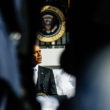Editor’s note: We’ve offered many critiques of the Bush administration’s decision to invade Iraq. But what we like about the case advanced by the author Dilip Hiro is that he takes the administration at its word that the real motive behind the invasion was to seed democracy in the volatile Middle East and thereby increase America’s security. It’s on those grounds precisely, Hiro argues, that the plan has failed. The invasion interrupted a decade-long regional trend toward greater free expression and access to information. Now the sectarian tensions exacerbated by three years of violence in Iraq is proving to be a boon to authoritarian leaders in neighboring countries. Arabs who advocate for democracy in the Middle East face more daunting challenges than ever.
Dilip Hiro is the author of Secrets and Lies: Operation “Iraqi Freedom” and After, and also The Iranian Labyrinth: Journeys Through Theocratic Iran and Its Furies, both published by Nation Books.
Recent events in the Middle East have highlighted two vital facts, both of which are unpalatable to the Bush administration. The first is that, given a free choice, voters in the region have opted to bring in Islamist parties or individuals to govern them. Secondly, the evolution of the fragile Iraqi government elected on sectarian or ethnic loyalties under the tutelage of the Anglo-American occupiers has provided a powerful argument to authoritarian and semi-authoritarian Arab regimes to resist political liberalization.
In January, Washington and other Western capitals were shocked at the landslide victory of Hamas in elections to determine the makeup of the Palestinian parliament. They shouldn’t have been surprised. The success of Hamas was just the latest manifestation of the rise of political Islam in the region’s electoral politics.
But 2005 had started similarly, with Islamist candidates winning most of the seats in the first, and very limited, municipal polls in Saudi Arabia; the year ended with the religious parties—both Shiite and Sunni—performing handsomely in Iraq in the parliamentary elections held in December. The Shiite United Iraqi Alliance won almost four-fifths of the seats provided for the majority Shiites. Likewise, the Iraqi Accord Front, a Sunni religious coalition centered around the Iraqi Islamic Party, won 80 percent of the places allocated for the Sunni community.
In between last year’s Saudi and Iraqi polls came other significant events. In Lebanon, Hizbollah emerged as the pre-eminent representative of the Shiites, the largest sectarian group, which had been grossly under-represented in Parliament, in the general election held in the summer. And in Egypt, in the first legislative assembly poll not flagrantly rigged by the regime there, the Muslim Brotherhood registered a nearly 60 percent success rate by winning 88 out of the 150 contested seats.
A DIVERSITY OF REASONS—The reasons for the Islamists’ advance, in each case and each country, are different. Take Iraq, for example. History shows that when an ethnic, racial or social group is persecuted or exploited, it turns to religion to find solace. Once Iraq became part of the (Sunni) Ottoman Empire in 1638, Shiites there were discriminated against. This continued after the dissolution of the Ottoman Empire when King Faisal, a Sunni, was installed by the British, and Sunnis were the leaders of the Baath Party, which seized power in 1968.
The mosque became the last resort for Iraq’s Shiites. Their religious hierarchy quietly set up a clandestine network during the years of Baathist rule. Then came the U.S. invasion. By following up the overthrow of Saddam Hussein’s regime in 2003 with the destruction of the state machinery—letting all the ministries, except oil, be looted and burned by mobs and, worse still, instantly disbanding the military, police and intelligence apparatus—the Pentagon created a massive political-administrative vacuum. It was immediately filled by the hitherto underground network of the Shiite religious establishment, backed up by the militias of the Shiite religious parties, including the Badr Brigade, which was established in Tehran during the 1980-88 Iran-Iraq War.
As for the Sunnis, the dominant minority for three and a half centuries, the 13-year-long period of United Nations economic sanctions hurt them as much as it did non-Sunnis. Continued impoverishment had led the Sunni masses, predictably, to turn to Islam. So it was not surprising that once the Sunnis decided to participate in the electoral process, most of them favored the Iraqi Accord Front.
There is no evidence to show that Iraqis were overwhelmingly secular under Saddam. Public opinion polls were banned by his regime. A more reliable indicator is a confidential 2004 poll, the results of which were eventually leaked, conducted for the International Republican Institute (IRI), an offshoot of the U.S. Republican Party. Seven out of 10 Iraqi respondents said that Sharia—i.e., the Islamic canon—should be the “sole basis” of Iraqi law, and the same proportion—70 percent—preferred the idea of having a “religious state,” with only 23 percent preferring a “secular state.”
The elections to Iraq’s transitional Assembly in January 2005, and to the subsequent Parliament, have underlined the veracity of the IRI survey. In the parliamentary poll, the secular Iraqi National List won only 9 percent of the seats and the secular Kurdistan Alliance, 17 percent.
WHY RELIGIOSITY GREW—Egypt is the country where the Muslim Brotherhood, the region’s oldest political party, was established in 1928. By inflicting a swift and humiliating defeat on the Egypt of President Abdul Gamal Nasser, who was wedded to Arab socialism, in June 1967, Israel delivered a near-fatal blow to secular Arab nationalism. In their hour of downfall, most Egyptians attributed the Israeli victory to the Jewish devotion to their religion and turned to Islam for their own spiritual succor. Though outlawed, the Muslim Brotherhood began gaining in popularity.
When Anwar Sadat, known for his earlier sympathies for the Brotherhood, succeeded Nasser in 1970, the pressure on the Brotherhood eased. Since then, the failure of Egypt’s pro-American president, Hosni Mubarak, to narrow the gap between the rich elite and the impoverished masses has provided the Brotherhood with an environment in which its slogan “Islam is the solution” has acquired increasing appeal.
Taking an overview, it is fair to say that both Arab socialism and American-style capitalism have failed to deliver the goods to the bulk of the Egyptian population, which seems ready to try the Third Way of Islam.
The Palestinian case is altogether different. The 38-year-long military occupation of Palestinian areas by Israel has spawned a politics that has no parallel anywhere else in the Arab world. Because the Palestinian state is not fully formed, ordinary people are able to exercise direct pressure on the leadership. Fatah, the governing party, which has proved corrupt and inept in administering the Palestinian entity, has seen its standing wane. By contrast, Hamas, with its history of providing free social services to the needy, is not tainted by corruption or cronyism. The ruling Fatah movement has suffered from tensions between local leaders and those who spent many years abroad before returning after the 1993 Oslo Accords. The leadership of Hamas is almost wholly local.
As a strategy to turn the Palestinians against Hamas, the sanctions imposed by the Bush administration are proving counter-productive. The Palestinians are blaming Israel and America, not Hamas, for their deepening misery. In the words of Gary Sussman, a political scientist at Tel Aviv University: “When people fight sanctions, it becomes a national project.” The suffering public rallies around its government. This is what happened in Iraq in the 1990s under the U.N. sanctions.
ZEROING IN ON IRAQ—Iraq’s elected representatives have adopted a constitution that, for all practical purposes, has turned the country into an Islamic republic. An article in the constitution states that Sharia is the fundamental source of Iraqi legislation. Another article says that no Iraqi law shall violate the undisputed principles of Islam. Both Prime Minister Nuri al Maliki and his predecessor, Ibrahim Jaafari, are leaders of the Islamic Daawa Party, committed to establishing an Islamic regime in Iraq.
These salient facts go unmentioned by officials of the Bush administration in Washington and Baghdad. If officials say anything at all about the Iraqi constitution, they express sympathy with the Sunnis’ criticism of its federal provisions, which would affect the Sunnis adversely.
It was only after the intervention by the U.S. ambassador to Iraq, Zalmay Khalilzad, an Afghanistan-born Sunni, that Shiite leaders agreed to a “review” of the constitution’s fairness. Once the new cabinet had been installed, on May 20, the Bush administration rushed to mention that Iraq’s Parliament would review the constitution within the next four months to address the Sunnis’ objections.
Sunnis fear that the existing Kurdistan Autonomous Region (KAR) in the northeast and the incipient Shia Autonomous Region in the south and southeast will garner the revenue from the oilfields existing in these areas, and leave the oil-less Sunni-dominated central and western Iraq penurious. It is unlikely that the Shiite United Iraqi Alliance, with 130 seats in the 275-member Parliament, will agree to overturn the federal provisions in the constitution.
By now, sectarian or ethnic identity has superseded the Iraqi national identity. The Iraqi Kurds have refused to compromise the KAR’s quasi independence to the extent that it is the Kurdish militia that guards Iraq’s border with Iran and Turkey, and the regional government refuses to let national troops enter the three provinces constituting the KAR.
The Kurds are ethnically different from Arabs and have inhabited the mountainous northeast of Iraq for centuries, but Sunni and Shiite Arabs have cohabited in the Mesopotamian plains since the rise of Islam in the seventh century. Greater Baghdad, accounting for a quarter of the national population, has been a mosaic of Sunni, Shiite and mixed neighborhoods. Now the mixed districts are turning into single-sect neighborhoods. Mosques that once attracted both Sunni and Shiite worshippers no longer do so. For protection, Shiite Baghdadis are turning to the uniformed police or army, whose personnel are mostly Shiite. Conversely, their Sunni counterparts call on local Sunni vigilantes for protection. A low-intensity civil war is under way in Iraq. This has caused alarm in other Arab countries.
REGIONAL CONSEQUENCES—The feeling of foreboding is one shared by both governments and intelligentsia within the Arab countries. They realize that every major country in the area is susceptible to the kind of division that is roiling Iraq. In Syria, for instance, Sunnis are only two-thirds of the population, the rest being Alawi, a subsect within Shiite Islam, as well as Druze and Christian. In Egypt, one of the most homogeneous of the Arab states, nearly 10 percent of the population is Christian. In Saudi Arabia, 8 percent of citizens are Shiite, almost all living in the oil-rich eastern province—and victims of official discrimination.
This state of affairs has provided powerful ammunition to authoritarian Arab regimes resistant to political reform. They warn that the American model of democracy will tear apart national identity and create divisive sectarian and ethnic identities, turning the region into mini-states along the lines of the post-Yugoslavia situation.
Also helping in this direction is the intense anti-Washington sentiment in the Muslim world stemming from the U.S. invasion of Iraq after making assertions about it that turned out to be false. There is little difficulty in marginalizing the advocates of political liberalization by describing them as allies of the hated Bush White House.
At the same time, there is much schadenfreude at Washington’s mounting predicament. “The Iraqi debacle is throwing U.S. policy off balance,” said a recent editorial in Al Ahram (The Pyramids), the official mouthpiece of the Egyptian government. “The United States needs friends in the region. It needs them to help it emerge from the Iraqi quagmire, but there is a price to pay, and that price may involve abandoning democratic reforms in Arab countries.”
DEMOCRACY ON ICE—In fact, the Pentagon’s assault on Iraq put a brake on the liberalizing trend—more marked in the economic and informational fields than in politics—that had been in progress in the region since the mid-1990s.
Like the rest of the world, Arab countries were affected by the economic globalization movement that gathered momentum with the collapse of the Soviet Union in 1991 and the transformation of the General Agreement on Tariffs and Trade (GATT) into the World Trade Organization (WTO) in January 1995. Globalization loosened the grip of dictatorial Arab states over the economy.
Equally, the arrival of the Internet and satellite television during the latter half of the 1990s undermined the monopoly over information that most Arab governments had arrogated for themselves.
The launching of the Doha-based Aljazeera satellite TV channel in 1997, followed by the abolition of censorship by Qatar’s ruler, Shaikh Hamad ibn Khalifa al-Thani, in 1998, broke the long-established mold of state-managed news in the Middle East. Aljazeera also pioneered talk shows, debates and investigative journalism of the sort not witnessed in the region before. The network broke taboos by interviewing Israelis and tackling such controversial issues as the role of religion in politics. At one time or another, almost all of the Arab states have closed down the local Aljazeera bureaus in protest against its editorial policies. Yet audience figures of some 35 million in the Arabic-speaking world have so impressed their governments that they, too, have tried to incorporate some of Aljazeera’s features.
Similarly, the information explosion from the early 1990s onward has impacted the Arab world. Internet use has become more common, and there has been a mushrooming of satellite television channels. The governments try to control information by blocking websites and banning satellite dishes. But those savvy about Internet technology invariably find ways to circumvent the barriers. Satellite dishes have become small enough to be mounted indoors.
Yet these developments have proved insufficient to prime a vigorous movement for political liberalization, committed to a representative government through elections and a choice of political parties. Perhaps what was missing was a catalyst to transform economic liberalization and the information explosion into an instrument for political reform. Those who urged Washington to invade Iraq confidently predicted that a democratic Iraq would come into being in the post-Saddam era, becoming a beacon of liberty, good government and the rule of law for the Arab world. Three years after Saddam’s overthrow, the reality is chaos and violence.
Instead of initiating and aiding a democratic wave in the Arab world, Bush’s invasion of Iraq has achieved the opposite result. Thus humbled, the Bush White House should accept political reality, and deal in a reasonable manner with organizations such as Hamas, the Muslim Brotherhood and Hizbollah—as it is already doing in the case of the United Iraqi Alliance and the Iraqi Accord Front.






0 Comments